With so many buzzwords used in beauty product marketing, sometimes it can be hard to discern what you think you’re buying versus what you’re actually getting. “Natural” and “Organic” are often thrown around to tout the purity of many beauty products — soaps especially — but the two terms mean very different things. One is a legally regulated term, and the other is much more vague. Read on to learn more about the important differences between these two labels.

Bramble Berry carries several certified organic products. From left to right: Organic Rosemary Essential Oil, Organic Melt and Pour Base and Virgin Coconut Oil.
Nat·u·ral:
existing in or caused by nature; not made or caused by humankind.
Or·gan·ic:
of, relating to, or derived from living matter.
Based on these dictionary definitions, there seems to be no difference between the terms. Do a little research though, and you’ll find that ‘organic’ is a strictly regulated term by the U.S. Department of Agriculture. According to the USDA website, “organic operations must demonstrate that they are protecting natural resources, conserving biodiversity, and using only approved substances.”
In order to be recognized as ‘organic’ product, the facility or farming operation must meet strict standards set and approved by the National Organic Program. The NOP regulates the creation, production, handling, labeling and enforcement of all USDA organic-certified products. In short, products labeled ‘organic’ did not earn the title lightly! Anything labeled organic went through a strict regulatory process, and you can feel confident that what you’re buying does not contain any synthetic additives or pesticides.
While many people may be used to seeing the ‘organic’ label on fruit, vegetables and meats on grocery store shelves, the term can also apply to products used in the beauty industry. For example, although Bramble Berry is not a certified organic warehouse, we do carry several certified organic products. They include:
Organic Oils Melt and Pour Base
Organic Lavender Essential Oil
Organic Rosemary Essential Oil
Virgin Coconut Oil
(the kit includes the Organic Melt and Pour base. The other ingredients in this kit are not organic)
If you’re still a bit confused, this summary from a USDA Organic FAQ pamphlet may clear things up for you: “Overall, if you make a product and want to claim that it or its ingredients are organic, your final product probably needs to be certified. If you are not certified, you must not make any organic claim on the principal display panel or use the USDA organic seal anywhere on the package.”
Navigating the term ‘Natural’
On the other hand, many soapers use the term ‘natural’ to denote that their soaps or products were made without synthetic dyes, oils or fragrances. The word ‘natural’ is an umbrella term that can be applied to almost anything that comes from nature. Unlike ‘organic,’ there is no legal hurdle when using the term ‘natural’. You can use ‘natural’ on your label when using many of our products from Bramble Berry.
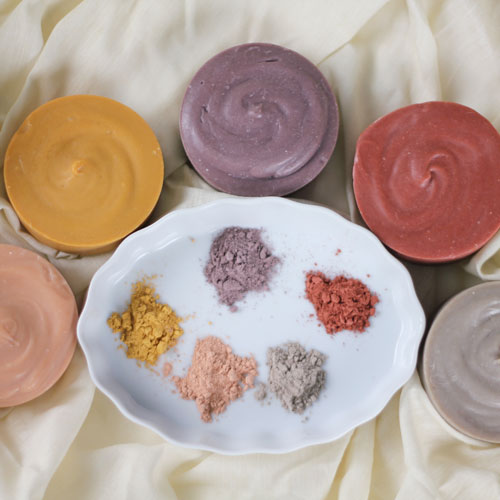
Bramble Berry carries several items that can be described as ‘natural’. For example, the clays in the Brazilian Clay sampler are natural because they do not contain any artificial dyes or ingredients — the clays are those lovely colors without the added help of dyes! The same can be said of our Natural Castile Liquid Soap Base, which does not contain any artificial detergents or colors. While these products are natural, they are not organic because they did not go through the rigorous process to earn the certification through the USDA. In fact, there is no ‘Natural Police’ that guard the term or have come up with standards for what ‘natural’ is or isn’t.*
* 4/14/16 UPDATE: While there are still no guidelines or a legal definition that constitutes a “natural” product, the Federal Trade Commission (which enforces truth-in-advertising laws) charged five companies for falsely promoting their products as being “all natural” or “100% natural” when the product contained synthetic ingredients. Read more about the charges here.
From an official standpoint, the USDA only has regulations for meat, poultry and eggs labeled as natural. To earn that label, those products “must be minimally processed and contain no artificial ingredients.” However, beyond that, “there are no standards or regulations for the labeling of natural food products if they do not contain meat or eggs.”
If you’re interested in learning more about using natural colorants or natural ingredients in your own products, check out these tutorials:
So, what does all this mean? The bottom line is that ‘natural’ is a common term in bath and beauty product marketing, and in most cases the ingredients and the products themselves really are natural, or only from nature. However, since the same stringent regulations do not exists for ‘natural’ products as they do for ‘organic’ products, it’s up to you to be an educated soaper and be aware of what you’re buying – and putting on your own labels.
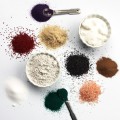
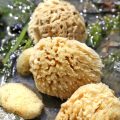
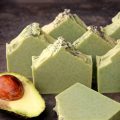
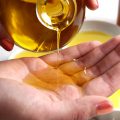

I’m going to be selling some soap to my brother’s church. Everything I’m using is organic except for the lye. Can I say “Contains organic ingredients” and be legal? Is lye even “natural” Thank you.
Hi Tracy!
In order to be labeled “organic,” the product has to contain 95% organic ingredients (not including salt and water). Lye is not a natural product. So, if your lye is used at 5% or less, it can be labeled organic.
There is also an option for “made with organic ingredients.” That can be used for products that contain at least 70% organic ingredients (not including salt and water). That may be an option for you. 🙂
Before labeling, I would recommend reading more about organic labeling here: http://www.ams.usda.gov/grades-standards/organic-labeling-standards
-Kelsey with Bramble Berry
Hi,
Can clear M&P soap base be made by CP method without adding any surfactants and alcohol ?
If yes, then can you share the reciepe for the same ?
Hi Bhawna!
We’ve been experimenting with making melt and pour recently and have not found any recipes without surfactants. You can make a soap with sugar and glycerin rather than alcohol, but the soap won’t be as clear.
You can find out how to make melt and pour with this book: https://www.brambleberry.com/Making-Transparent-Soap-1-Book-P3732.aspx
-Kelsey with Bramble Berry
How can your soap be Certified Organic if soap contains water?
Hi RD!
That’s a great question! To be considered organic, a product must contain at least 95% organically produced ingredients, excluding water and salt. A product can also be labeled “contains organic ingredients” if it has at least 70% organic ingredients, not including water and salt.
Our melt and pour base is labeled as “organic oils,” meaning the coconut and palm oils used are organic. That may be an option for your soap as well. 🙂
To find out more about organic labels, you can check out the USDA National Organic Program guidelines: http://www.ams.usda.gov/AMSv1.0/getfile?dDocName=STELPRDC5068442
-Kelsey with Bramble Berry
Organic Melt and Pour Base: https://www.brambleberry.com/Organic-Melt-Pour-Base-P4382.aspx
Thank you so very much for your quick and informative reply, it is much appreciated!
You’re welcome! Happy to help. 🙂
-Kelsey with Bramble Berry
So what product do you recommend NOT to use the clays for? Can it be used in bath bombs?
Hi Carissa!
You can use clays in whatever you like, including bath bombs! Just keep in mind clays absorb moisture, so they can be drying. It may help to make a small test batch with the clays to see if you like how they feel. 🙂
Lavender and Clay Mondo Bath Fizzy: http://www.soapqueen.com/bath-and-body-tutorials/bath-fizzies/lavender-clay-mondo-bath-fizzy/
-Kelsey with Bramble Berry
Hello,
I’m a little confused. If you purchase the virgin coconut oil as “organic” why does the inci on the website not include the word organic? Is this because it’s not a finished product? Could I use the word organic to describe the oil on the label of my soap that I make with it?
Thanks,
Sarah
Hi Sarah!
This is a great question. Yes, you can use the term organic on your labeling because this product is certified organic. Something to keep in mind, while this is purchased from a certified organic manufacturer, Bramble Berry is not a certified organic facility and we cannot list it as such.
Something else to keep in mind is that at this time using the term organic on any cosmetic is not regulated. You can read more about this on the FDA’s webpage below.
FDA on Organic Cosmetics: http://www.fda.gov/Cosmetics/ProductandIngredientSafety/ProductInformation/ucm203078.htm
Here is the text from the page:
Q: Does FDA have a definition for the term “organic”?
A: No. FDA regulates cosmetics under the authority of the Federal Food, Drug, and Cosmetic Act (FD&C Act) and the Fair Packaging and Labeling Act (FPLA). The term “organic” is not defined in either of these laws or the regulations that FDA enforces under their authority.
I hope this helps!
-Amanda with Bramble Berry
Hello! I just wanted to throw another thought out there about the word “Natural”. People look for
“natural” products but not everything that is natural is necessarily good. For example, Arsenic, Uranium and Cyanide are all natural products; as in not made by man. This post is very helpful, hopefully it will help all of us educate the public better!
Oh that is so true! Natural doesn’t always mean better. As a marketing term, it’s commonly abused or misused and I’m hoping this blog post can help clear some of that usage up. =)
Personally I don’t use Organic ingredients in my soaps. I don’t find there is enough of a market where I live.
But when it comes to natural, I will sometimes add little noted to my labels like “uses natural colourants”, or “Natural flavour”.
It it my opinion that the soap as a final product isn’t natural, because it had to be reacted and mixed my a human or a machine. So I choose not to label my soaps as being “Natural”.
But of course, I don’t discourage other people from doing what they believe is best for their product.
It always makes me happy to see educational blog posts, especially ones that boarder agriculture. I studied agriculture in College, although I’m more going down this career path, my choice of studies have helped greatly with my soap making. 🙂
Hi Lianne!
Thanks for sharing your thoughts with us regarding this topic. Because the term “natural” is not regulated, it’s always interesting to see how different crafters navigate it. I’m really happy that you found this blog post helpful! 🙂
-Amanda with Bramble Berry
Thanks for posting this! It really makes things clear. Since we want to be reputable soapers and not snake oil salesmen it is important not to make dubious claims. I am glad to see that you have it clearly laid out which claim you need to be certified for.
I would be interested to see a discussion on micas, oxides, and other natural equivalent dyes. I see it has come up in the comments. Many are made in labs for color purity, so are they natural or not? I buy all my colors from Bramble Berry, so I am sort of interested in what you guys think about this.
Hi Margaret,
Yes, that question is a tricky one! The reason why we left oxides out of our list is that all oxides for cosmetic use in the US are made in a lab. They are made to be identical to those found in nature but without all of the impurities that are found when mined from the earth. However, again since the term natural isn’t regulated many cosmetic companies use oxides and call them natural. We like to say nature-identical when describing them to be more accurate.
Hope this helps to answer your question!
~Amber
Yes, Micas are made in a lab, how can they be Natural? Is it because they are identical to those found in nature? Thus they can be called Natural, but never Organic?
Hi Liv!
Good question. Some micas are natural and some are not. It depends on where their source of color comes from. Our micas that aren’t considered natural would be the ones that contain FD&C dyes. For example, the Cellini Red Mica contains D&C Red 7 which makes this colorant not natural. Copper Sparkle Mica, on the other hand, only contains mica and iron oxides, which both readily occur in nature so it is considered ‘natural’. You’re correct, these would not be considered organic.
Cellini Red Mica: https://www.brambleberry.com/Cellini-Red-Lip-Safe-Mica-P3068.aspx
Copper Sparkle Mica: https://www.brambleberry.com/Copper-Sparkle-Mica-P3062.aspx
I hope this helps Liv! 🙂
-Amanda with Bramble Berry
I was just looking at the ingredients in your “natural” Brazilian Clays, all of which contain Mica, which seems to be the determining factor & ingredient that gives the variation in color in (I think,) most of them, since most of the INCI names all include the same ingredients yet they are different colors
Please read the following article and then tell me if you still believe your Brazilian Clays are “all natural, containing no artificial dyes or ingredients.”
http://pallasathenesoap.com/articles/Micas.pdf
Thanks!
Hi Patricia,
Thanks for your question about our Brazilian Clays. It’s true that most micas get their color from dyes or oxides that are added to them. For instance, you will see if you look at our blue mica that the ingredients include mica and Blue 1 – a synthetic dye.
The Brazilian Clays on the other hand actually get their color from variations in the Kaolin and Montmorillonite. I know it’s strange that you can get color variations from the same ingredients but there are other instances of this. You will see that the inci for Rose Clay is Kaolin – as is the inci for the white Kaolin clay. Another example is that Red Oxide, brown oxide and black oxide all have the same inci.
The mica that is added to the Brazilian Clay is not for color but rather for texture. And while I do realize that there is synthetic mica out there – our vendor tells us that the Brazilian Clays do not have man-made ingredients. Yes, it’s true that natural mica is more expensive than synthetic which explains why the Brazilian Clays are almost double the price of our other clays.
I hope this answer addresses your concerns.
Thank you so much for respecting us so much that you ask us for clarification, we appreciate the trust you’ve shown in posting your comment and question.
~Amber
Hey Anne-Marie, I have a question.. I heard a rumor that technically no CP soap can ever be labeled organic because it always contains lye (technically a chemical and definitely made in a lab). That’s true according to this article right? I keep seeing CP or HP soap labeled as organic and thinking that can’t be right.
thanks, great article!
Thank you for asking this, Sudsy, the same question has been haunting me forever!! Can ANY Cold Process soap EVER be considered 100% Organic? How can people put “Organic” on their CP soaps’ labels?!
Also, can CP soap ever even be labeled as “Natural”? Lye is made in a lab, after all; doesn’t come from nature…
Hi there!
This is a great question. Basically the answer is no, you cannot label a soap as organic.
I am not sure it is possible to get lye certified as organic even if the operations meets the FDA’s definition of “organic” (IE “organic operations must demonstrate that they are protecting natural resources, conserving biodiversity, and using only approved substances.”) I do know that the FDA will not certify salt as organic at this time, so I’m thinking lye production has more in common with salt than say vegetables. That being said, The FDA does not have a definition for “organic” cosmetics.
FDA on Organic Cosmetics: http://www.fda.gov/Cosmetics/ProductandIngredientSafety/ProductInformation/ucm203078.htm
Here is the text from the page:
Q: Does FDA have a definition for the term “organic”?
A: No. FDA regulates cosmetics under the authority of the Federal Food, Drug, and Cosmetic Act (FD&C Act) and the Fair Packaging and Labeling Act (FPLA). The term “organic” is not defined in either of these laws or the regulations that FDA enforces under their authority.
I hope this helps!
-Amanda
This is an awesome breakdown! Thanks you! I agree that its so much confusion with the terms and what it mean!
Hi Renee!
I’m so glad you found this post helpful 🙂 It can be confusing, so I’m glad we could help shed some light on the topic.
-Amanda with Bramble Berry
I was having a discussion with another soap maker about “Organic” soap and how the term is really being misused and misunderstood these days. Great explanations here.
Good morning!
I’m so glad you found this post helpful :). It can be a confusing topic, I’m glad we could help!
-Amanda with Bramble Berry
So, I am wondering, you have 2 Castile liquid soap bases. What makes one natural, and the other one *not natural? They look to have the same ingredients.
You can get organic and non-organic olive oil. I think the organic Castile base would have organic olive oil………………
Hi Luann,
One of the Castile bases is ready to use and one is the paste for you to dilute to make your own liquid soap. They are both natural. The only real difference being the amount of water in them.
~Amber
Talk about a useful article! Perfect for soap makers and the homemade product consumer!
Hi Leanna!
I’m so happy to hear you found this post helpful to you 🙂
-Amanda with Bramble Berry
Ok. So are not my soaps naturals if I use fragrance to make them? All oils I use to make soaps are organic but one, cant say they are organics?
Hi Vita!
Fragrance Oils are made up of hundreds of synthetic ingredients, and most would not consider them a natural product. Essential Oils are considered natural, and some are organic, some are not. Just like food – some essential oils are agricultural products and the rules as to what constitutes an organic agricultural product are made and regulated by governmental agencies such as the Department of Agriculture (USDA) in the USA.
But whether you call your soaps natural or not is up to you. The term natural is not regulated and how you market your soaps is really dependent on what you feel is truthful. I think you can say things like made with natural oils and butters or contains XX% natural ingredients.
I hope this helps Vita!
-Amanda
THanks for this great information. I’m always looking for and reading up on this kind of info. I like using all the great colors and fragrances that are available, but I also like, as do many of my friends, more organic and natural options. The trick is to understand what. After all sulfuric acid is “natural”, but it doesn’t belong in my soap….
Hi Michael!
I’m happy to hear you enjoyed this post. I agree, part of the fun of soapmaking is that there are so many options in terms of ingredients!
-Amanda with Bramble Berry